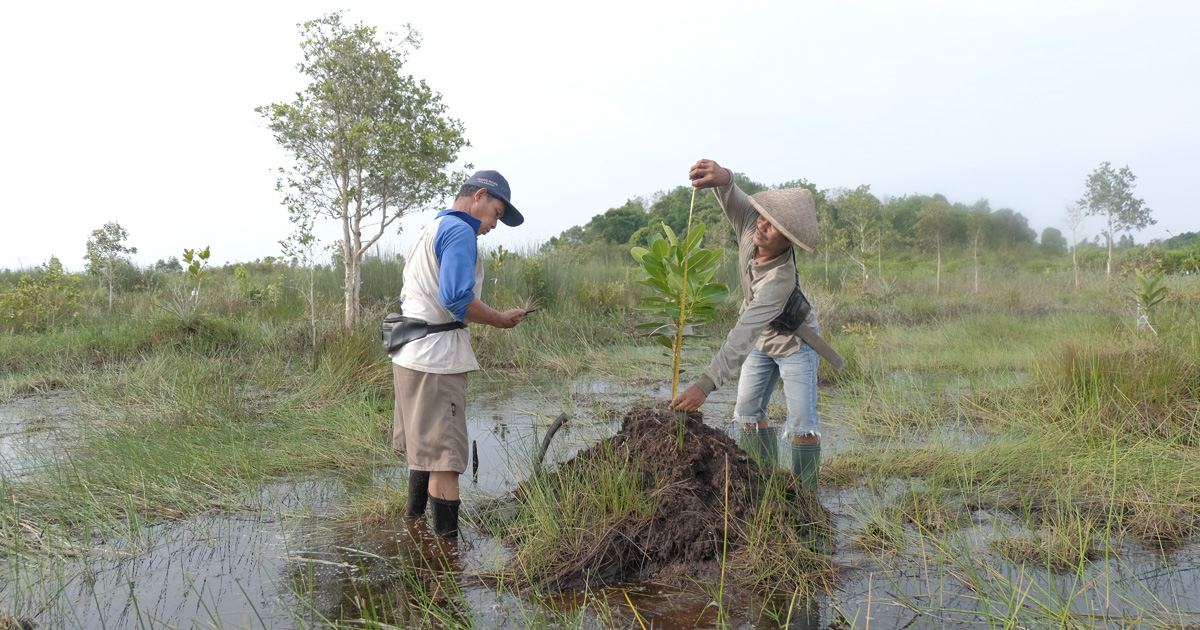
Partnership set to enhance research on degraded forest landscapes
By Robert Finlayson
Forest rehabilitation and peatland restoration are cornerstones of the Indonesian government’s strategy to achieve its climate mitigation goals, which include making the country’s forests and other land uses a net sink of carbon by 2030, as part of its Nationally Determined Contribution to the United Nations Framework Convention on Climate Change.
To support this strategy, the Center for International Forestry Research and World Agroforestry (CIFOR-ICRAF) is leading a collaborative research project, ‘Sustainable Community-based Reforestation and Enterprises 2021–2030 (SCORE)‘, which seeks to help facilitate the achievement of both climate and livelihood goals by building better understanding of how to enact effective and appropriate forest landscape restoration.
“SCORE aims to enable long-term mitigation of greenhouse gas emissions, specifically through better understanding of locally-appropriate, climate-smart agroforestry,” said Himlal Baral, a senior restoration scientist with CIFOR-ICRAF’s Climate, Energy and Low Carbon team.
Since initiating the project in 2021, CIFOR-ICRAF and its founding partners realised that “a number of institutions were also working on related research – often in specialized topics relevant to, but not covered by, SCORE,” said Baral. “We saw this as an opportunity to share knowledge, support each other’s efforts, and increase impact by forming a national partnership.”
To that end, SCORE held a hybrid workshop on 14 December 2023 at the CIFOR-ICRAF campus in Bogor, Indonesia to inaugurate a partnership of research bodies dedicated to forest landscape restoration. Together, they are researching approaches for restoring degraded peat and mineral land while producing food, material, and bioenergy to enhance communities’ livelihoods.
At the workshop, partners presented research on a wide range of topics, from the multiple benefits of traditional medicinal plants, to cultivating oil-producing trees for biofuel, and the potential of climate-smart agrosilvofishery, which is the integration of trees, seasonal crops and fishery on the same plot of land.
The workshop participants also had the opportunity to collaborate on discussing potential proposals to the Developing Research Capacity of Universities in Southeast Asia on Forest Landscape Governance (Explore) program run by The Center for People and Forests (RECOFTC) with funding from the Government of Sweden.
“’Explore’ aims to support governments in using high-quality research to improve policies and institutional frameworks for inclusive and sustainable development of forest landscapes in Southeast Asia that contributes to climate and development goals,” said Yustina Artati, a senior research officer with CIFOR-ICRAF’s Climate, Energy and Low Emissions team and the CIFOR-ICRAF representative for Explore. “The other ambition of Explore is to improve researchers’ capacity through grants to fund research.”
Participants also explored opportunities and modalities for strengthening collaboration on current projects in South Sumatra, Central Kalimantan, Java, East Kalimantan, Bali and beyond. They discussed best practices (what worked well, what didn’t work, and areas of improvement); research partnerships; dissemination of findings to government and/or practitioners; challenges and opportunities in increasing the scale of successful demonstration models; and collaborative and coordinated actions, including the joint development of funding proposals.
“We expect that the partnership will contribute important findings toward achieving national goals for restoration of degraded land and the mitigation of, and adaptation to, climate change,” said Baral. “We are actively seeking other partners, donors and investors to contribute to the research and to increase the scale of successful demonstration sites. This will also support improvement of communities’ livelihoods through diversifying production while at the same time enhancing biodiversity.”
For more information, please contact Himlal Baral: h.baral@cifor-icraf.org.
Acknowledgements
Partners that presented at the workshop include the Center for International Forestry Research and World Agroforestry (CIFOR-ICRAF), South Korea’s National Institute of Forest Science (NIFoS), Indonesia’s National Research and Innovation Agency (BRIN), Sriwijaya University, Udayana University, the University of Palangka Raya, and the University of Mulawarman.


















